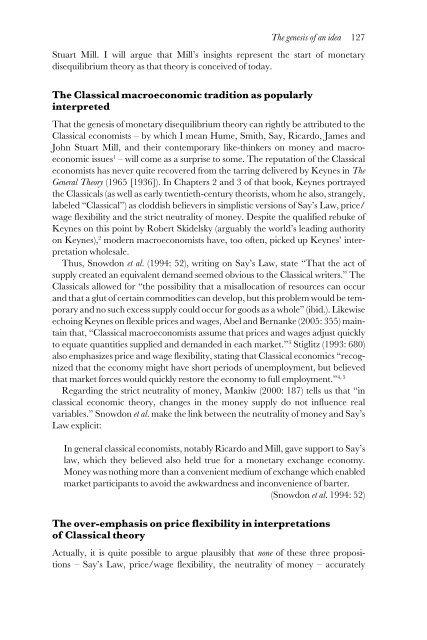Money and Markets: Essays in Honor of Leland B. Yeager
Money and Markets: Essays in Honor of Leland B. Yeager
Money and Markets: Essays in Honor of Leland B. Yeager
You also want an ePaper? Increase the reach of your titles
YUMPU automatically turns print PDFs into web optimized ePapers that Google loves.
The genesis <strong>of</strong> an idea 127Stuart Mill. I will argue that Mill’s <strong>in</strong>sights represent the start <strong>of</strong> monetarydisequilibrium theory as that theory is conceived <strong>of</strong> today.The Classical macroeconomic tradition as popularly<strong>in</strong>terpretedThat the genesis <strong>of</strong> monetary disequilibrium theory can rightly be attributed to theClassical economists – by which I mean Hume, Smith, Say, Ricardo, James <strong>and</strong>John Stuart Mill, <strong>and</strong> their contemporary like-th<strong>in</strong>kers on money <strong>and</strong> macroeconomicissues 1 – will come as a surprise to some. The reputation <strong>of</strong> the Classicaleconomists has never quite recovered from the tarr<strong>in</strong>g delivered by Keynes <strong>in</strong> TheGeneral Theory (1965 [1936]). In Chapters 2 <strong>and</strong> 3 <strong>of</strong> that book, Keynes portrayedthe Classicals (as well as early twentieth-century theorists, whom he also, strangely,labeled “Classical”) as cloddish believers <strong>in</strong> simplistic versions <strong>of</strong> Say’s Law, price/wage flexibility <strong>and</strong> the strict neutrality <strong>of</strong> money. Despite the qualified rebuke <strong>of</strong>Keynes on this po<strong>in</strong>t by Robert Skidelsky (arguably the world’s lead<strong>in</strong>g authorityon Keynes), 2 modern macroeconomists have, too <strong>of</strong>ten, picked up Keynes’ <strong>in</strong>terpretationwholesale.Thus, Snowdon et al. (1994: 52), writ<strong>in</strong>g on Say’s Law, state “That the act <strong>of</strong>supply created an equivalent dem<strong>and</strong> seemed obvious to the Classical writers.” TheClassicals allowed for “the possibility that a misallocation <strong>of</strong> resources can occur<strong>and</strong> that a glut <strong>of</strong> certa<strong>in</strong> commodities can develop, but this problem would be temporary<strong>and</strong> no such excess supply could occur for goods as a whole” (ibid.). Likewiseecho<strong>in</strong>g Keynes on flexible prices <strong>and</strong> wages, Abel <strong>and</strong> Bernanke (2005: 355) ma<strong>in</strong>ta<strong>in</strong>that, “Classical macroeconomists assume that prices <strong>and</strong> wages adjust quicklyto equate quantities supplied <strong>and</strong> dem<strong>and</strong>ed <strong>in</strong> each market.” 3 Stiglitz (1993: 680)also emphasizes price <strong>and</strong> wage flexibility, stat<strong>in</strong>g that Classical economics “recognizedthat the economy might have short periods <strong>of</strong> unemployment, but believedthat market forces would quickly restore the economy to full employment.” 4, 5Regard<strong>in</strong>g the strict neutrality <strong>of</strong> money, Mankiw (2000: 187) tells us that “<strong>in</strong>classical economic theory, changes <strong>in</strong> the money supply do not <strong>in</strong>fluence realvariables.” Snowdon et al. make the l<strong>in</strong>k between the neutrality <strong>of</strong> money <strong>and</strong> Say’sLaw explicit:In general classical economists, notably Ricardo <strong>and</strong> Mill, gave support to Say’slaw, which they believed also held true for a monetary exchange economy.<strong>Money</strong> was noth<strong>in</strong>g more than a convenient medium <strong>of</strong> exchange which enabledmarket participants to avoid the awkwardness <strong>and</strong> <strong>in</strong>convenience <strong>of</strong> barter.(Snowdon et al. 1994: 52)The over-emphasis on price flexibility <strong>in</strong> <strong>in</strong>terpretations<strong>of</strong> Classical theoryActually, it is quite possible to argue plausibly that none <strong>of</strong> these three propositions– Say’s Law, price/wage flexibility, the neutrality <strong>of</strong> money – accurately
















